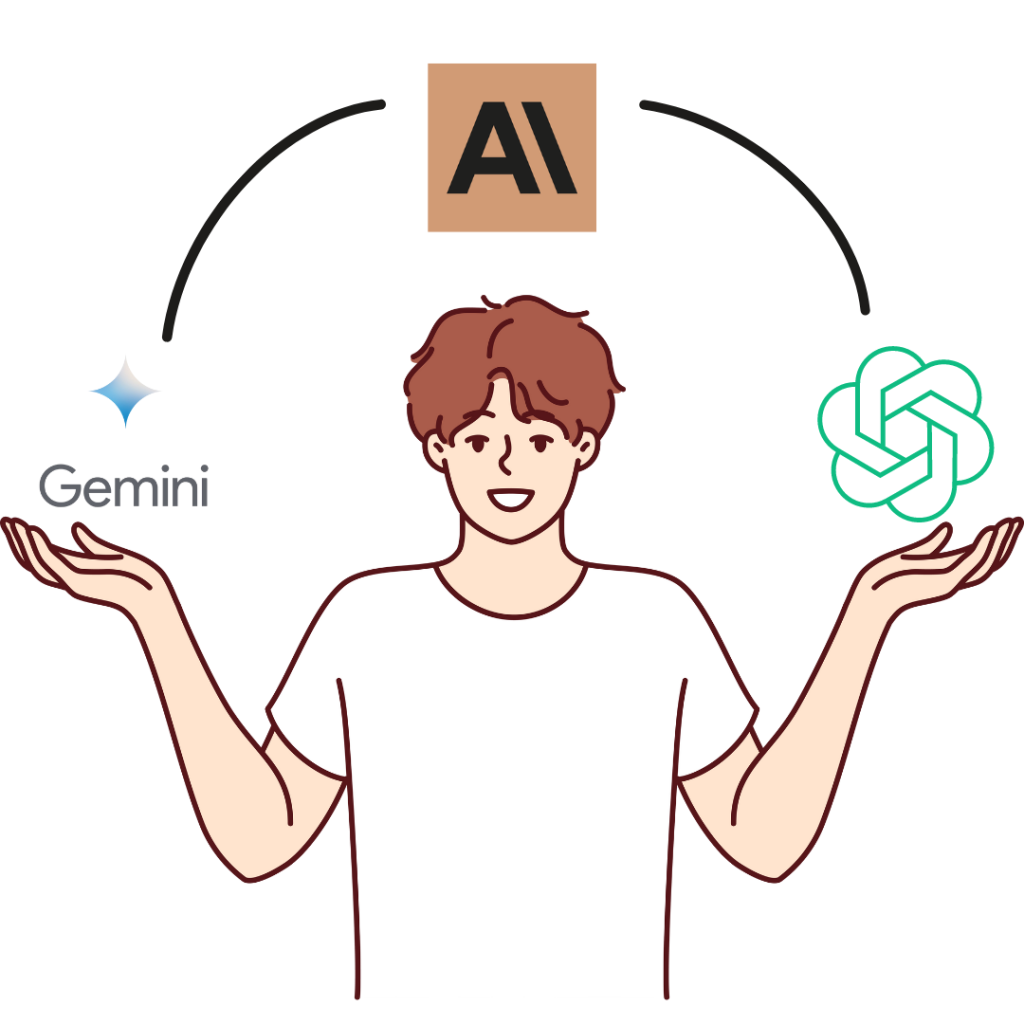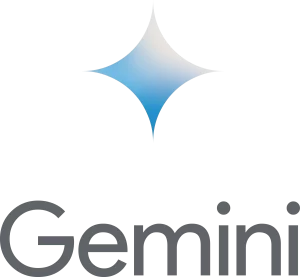Maximizing AI in Digital Marketing: A Strategic Guide to ChatGPT, Claude, and Gemini

Was this article written by AI, a human, or both? Leveraging the latest advancements in language models has become a critical strategy for brands aiming to stay ahead. With the rise of Large Language Models (LLMs) such as ChatGPT, Claude, and Gemini, marketing managers are provided with powerful tools to enhance their strategies. However, the key to maximizing their benefits lies not just in their use but in understanding their differences, how they work, and the best practices for each. This strategic overview aims to guide marketing teams towards efficient and effective utilization of these technologies.
Ways to Use LLMs
To get started, picture these common scenarios:
- Struggling to come up with fresh ideas for social media posts? LLMs can generate catchy captions and suggest different content formats.
- Need to draft multiple product descriptions in a short time? These tools can quickly create outlines and variations for your listings.
- Overwhelmed by the amount of customer support inquiries? LLMs can handle basic questions and even personalize responses.
How They Work
Large Language Models (LLMs) are essentially advanced autocomplete tools on steroids.
They learn from massive amounts of text data and try to predict what the next word or phrase should be based on the input you provide. This means that, with careful guidance, they can craft helpful content, but you’ll want to make sure they don’t make up facts or go wildly off-subject.
 ChatGPT, developed by OpenAI, is a variant of the GPT (Generative Pre-trained Transformer) model. It’s designed to understand and generate human-like text based on the input it receives. This technology thrives on its ability to produce coherent and contextually relevant responses, making it an excellent tool for content creation, customer service automation, and personalized communication.
ChatGPT, developed by OpenAI, is a variant of the GPT (Generative Pre-trained Transformer) model. It’s designed to understand and generate human-like text based on the input it receives. This technology thrives on its ability to produce coherent and contextually relevant responses, making it an excellent tool for content creation, customer service automation, and personalized communication.
![]() Claude, crafted by Anthropic, is another AI conversational model, emphasizing safety and alignment with user intentions. It distinguishes itself with its ability to understand nuances in instructions and generate responses that are not just accurate but also aligned with ethical guidelines and user objectives. This makes Claude particularly useful for brands that prioritize safety and ethical considerations in their communications.
Claude, crafted by Anthropic, is another AI conversational model, emphasizing safety and alignment with user intentions. It distinguishes itself with its ability to understand nuances in instructions and generate responses that are not just accurate but also aligned with ethical guidelines and user objectives. This makes Claude particularly useful for brands that prioritize safety and ethical considerations in their communications.
 Gemini, introduced by Google, leverages LaMDA (Language Model for Dialogue Applications) to offer conversational capabilities. Gemini excels in incorporating real-time information from the web, providing answers that are not only contextually relevant but also up-to-date. This feature is invaluable for creating content that requires the latest information or for customer service applications where accuracy and timeliness are critical.
Gemini, introduced by Google, leverages LaMDA (Language Model for Dialogue Applications) to offer conversational capabilities. Gemini excels in incorporating real-time information from the web, providing answers that are not only contextually relevant but also up-to-date. This feature is invaluable for creating content that requires the latest information or for customer service applications where accuracy and timeliness are critical.
While ChatGPT, Gemini, and Claude are all impressive, they each have nuances that affect how they’re best used. At the end of the day, they are each tools tailored for specific jobs and do those jobs quite well.
Key Differences
Understanding the key differences between ChatGPT, Claude, and Gemini is crucial for marketing managers aiming to leverage these AI tools strategically within their digital marketing efforts. Each platform has its unique strengths and functionalities, tailored to different aspects of content creation and customer engagement. Here’s a deeper look into how these differences can influence your marketing strategies:
ChatGPT: The Content Generation Powerhouse
ChatGPT, developed by OpenAI, stands out for its advanced natural language processing abilities, enabling it to generate high-quality, diverse content across various formats. This includes blog posts, social media updates, email campaigns, and more. Its conversational capabilities also make it an excellent tool for creating chatbots and interactive customer service experiences. ChatGPT’s versatility in content generation makes it a valuable asset for marketing teams looking to produce a wide range of content efficiently.
Best Practices:
-
Diverse Content Creation:
Diverse Content Creation: Utilize ChatGPT to automate the creation of diverse content types, ensuring consistency and brand voice across all platforms. -
Interactive Experiences:
Develop chatbots or interactive customer service tools that can provide immediate assistance or engage users in meaningful conversations.
Claude: Prioritizing Safety and Ethics
Claude, created by Anthropic, emphasizes safety and ethical considerations in content generation. It’s designed to minimize the risks of generating harmful or biased content, making it particularly suitable for brands that prioritize maintaining a responsible and positive online presence. Claude’s focus on ethical AI use ensures that content aligns with brand values and societal norms, reducing the risk of reputational damage.
Claude was also made to mimic a personal assistant, so you tend to get more polished output. IT also seems to understand instructions better like asking for a 1200 word blog post will generate a 1200 word blog post. Ask ChatGPT to do that and you get a 400 word blog post – in my experience at least. Click here for more information.
Best Practices:
-
Brand Safety:
Deploy Claude in contexts where brand safety and ethical considerations are paramount, such as sensitive topics or industries. -
Content Review:
Leverage Claude's ethical guidelines to guide content creation but maintain a review process to ensure alignment with specific brand values and audience expectations.
Gemini: Real-time Information Integration
Gemini, developed by Google, is notable for its ability to integrate with Google’s search capabilities, providing real-time information that can be incorporated into content creation and customer interactions. This feature is particularly useful for content that requires up-to-date information, such as news articles, market trends, or product information. Gemini’s strength lies in enhancing content relevance and accuracy, offering a competitive edge in fast-paced industries.
Best Practices:
-
Current Events and Trends:
Use Gemini to generate content that benefits from real-time information, such as industry news, trend analysis, and product updates. -
Enhanced Customer Support:
Implement Gemini in customer support channels to provide timely and accurate responses to inquiries, leveraging the latest information available.
Strategic Integration into Digital Marketing
Marketing managers should consider these key differences when integrating ChatGPT, Claude, and Gemini into their digital marketing strategies. It’s not just about choosing one over the others but rather understanding how each can complement different aspects of your marketing efforts. For instance, ChatGPT can serve as the backbone for generating a wide range of creative content, Claude can ensure that all content adheres to ethical standards and brand values, and Gemini can keep your content and interactions informed with the latest information.
Common Pitfalls to Avoid
-
Over-Reliance on Automation:
While AI can significantly enhance efficiency, it’s crucial to maintain human oversight to ensure content quality and relevance. -
Ignoring Platform Strengths:
Utilize each AI tool according to its strengths rather than adopting a one-size-fits-all approach. -
Neglecting Ethical Guidelines:
Pay attention to the ethical implications of AI-generated content, especially when dealing with sensitive topics.
ChatGPT, Claude, and Gemini each offer unique advantages for digital marketing strategies. By understanding their differences and applying best practices tailored to each model, marketing managers can enhance their teams’ efficiency, creativity, and effectiveness. The key to success lies in strategic integration, ethical use, and maintaining the human element in digital interactions. Get in touch with us to learn more about utilizing AI to its fullest.
About the Author

Kevin Bossons
Senior Digital Strategist
With over 15 years of experience in digital marketing and search engine optimization, Kevin has grown from an SEO contractor to Senior Digital Strategist at WT Digital Agency.